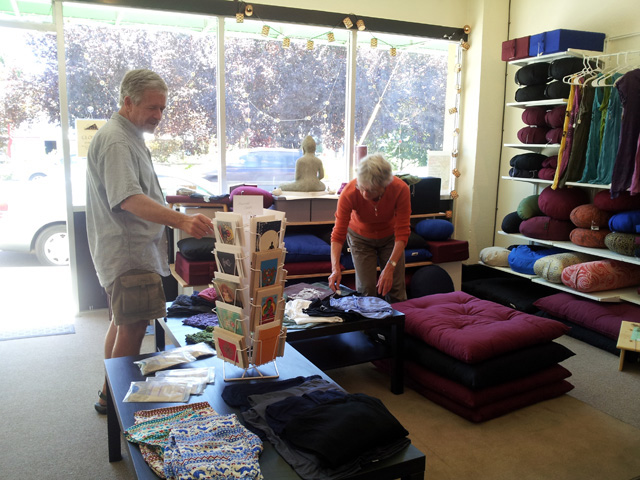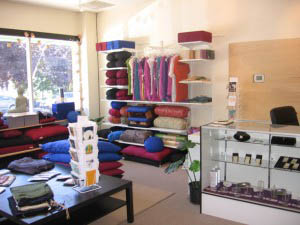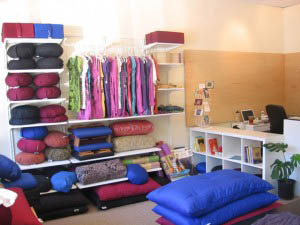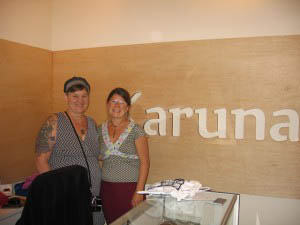New Portland Store Offers Meditation Cushions
You Can Try Them There, and See What Fits
Written by: Anandi Gefroh

Two customers look over cushions and other goods at the store.
Photos by: Anandi Gefroh
Karuna Contemplative Living, which may be Portland’s first meditation cushion and supplies store, was created to serve the needs of meditators.
As a teacher and meditation instructor at the Portland Shambhala Meditation Center, I often saw how few people actually had cushions for home practice. This surprised and bothered me.
Once I asked a group of participants if they had a cushion at home and nobody did. That’s when it dawned on me that I should create a convenient way for people to get cushions locally, where they could try them to see which one fit their body best.

The store showcases a variety of cushions.
No more folded bed pillows and blankets!
As I watched meditation become more widely accepted, on the cover of Time Magazine and referenced on television and in movies, I felt the market was widening, and that there was a need for a local retail outlet that specialized in meditation supplies.
As a lifelong meditator I have experienced the importance of a proper seat, and have come to believe a good posture can enrich our practice.
One of the advantages Karuna offers over buying cushions on the internet is that people can have a hands-on experience with different cushions, and see which is best for their body. As a trained meditation instructor with more than 20 years of experience, I can help guide customers to the best seat for their individual needs.
Most cushions sold at Karuna are made regionally, and the Karuna-brand cushions are made right here in Portland by Natural Felt!

Clothes for sitting and zabutons round out the collection.
I grew up Buddhist and yet I see Karuna as a non-denominational business. Many of my customers do not belong to a Buddhist community, often called a sangha, and I see Karuna as helping bridge the gap between Buddhists and others.
People seem to be seeking meditation but don’t want to belong anywhere. They read books, listen to tapes, but don’t actively seek out kindred spirits. It’s a personal thing. Perhaps Karuna can offer a middle ground as an educational resource, offering information so people can find it when they are ready.
It’s clear to me that many of the types of meditation practiced today are rooted in the Buddha’s teachings. Many books on meditation have at least some introduction or explanation of Buddhist thought.
More than 40 percent of Portlanders say they are religiously unaffiliated. And yet, with the city brimming with yoga studios and meditation groups, there seems to be an immense interest in seeking meaning through these ancient traditions. While there is increased interest in meditation, there is also an all-time high in distraction, stemming mainly from our modern devices.

The view from the street.
Karuna means compassion in Sanskrit. But what is contemplative living? It means taking a pause to contemplate your life.
What motivates you? How do you relate to your life and those in it? How do you actually feel, both in body and mind?
Contemplative living means taking a pause from distractions and getting very curious about ourselves and the world around us, our inner and outer environments. Once we see what is going on we discover our humanness and it softens our hearts. At that point Karuna, or compassion, becomes a helpful tool.
These days people are teaching meditation in schools, prisons, the military and even in some corporations.
In Portland, interest was roused by a pilot mindfulness meditation program at Wilson High school last year, presented by Peace In Schools. The program was so successful that it will be expanded to Lincoln and Cleveland high schools next year.

Owner Anandi Gefroh, right, and Terri Treat, left, at the grand opening. Treat owns Natural Felt, a maker of Karuna cushions.
In healthcare, mindfulness meditation is often used to treat cases of post-traumatic stress syndrome among Iraq war veterans. The Shambhala Prison program has taught meditation programs at the state penitentiary in Salem for the past eight years.
More evidence of society’s expanding curiosity about meditation is the fact that Mindful Magazine is sold at places like Whole Foods and New Seasons. Online magazines like Elephant and Tiny Buddha are becoming a significant voice for the next generation of meditation practitioners. Some even call this a “Mindfulness Movement.”
I was most pleased to discover that the person who managed my loan is studying with Tibetan teacher Anam Thubten, and will soon be going on his first retreat.
The world of meditation practitioners is getting bigger and bigger. It will be interesting to see how things evolve; how Buddhists will inform the mindfulness meditation movement, and whether these practitioners also study Buddhist teachings. Perhaps this will change how both the practice and study of meditation is presented.
As this happens, Karuna Contemplative Living will be right there in Portland, to support what arises.
